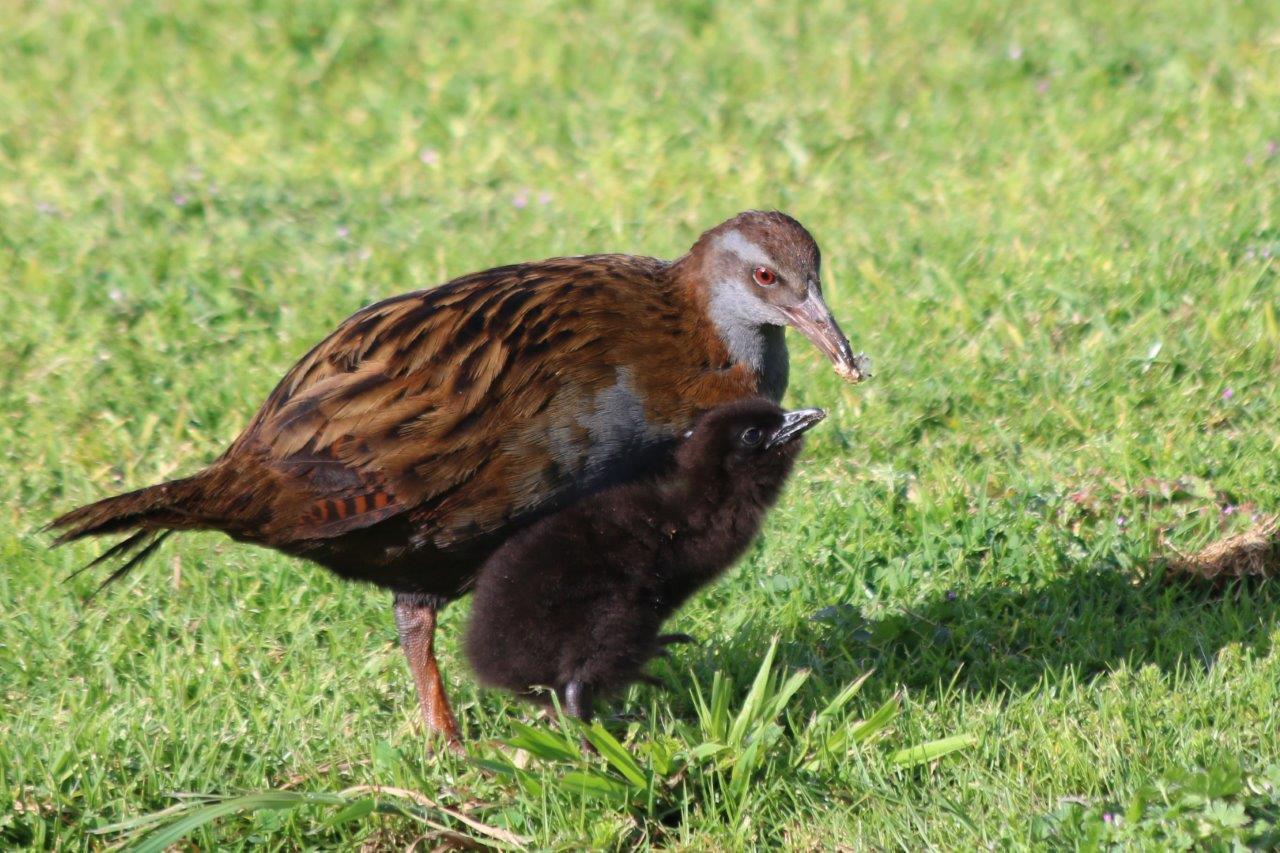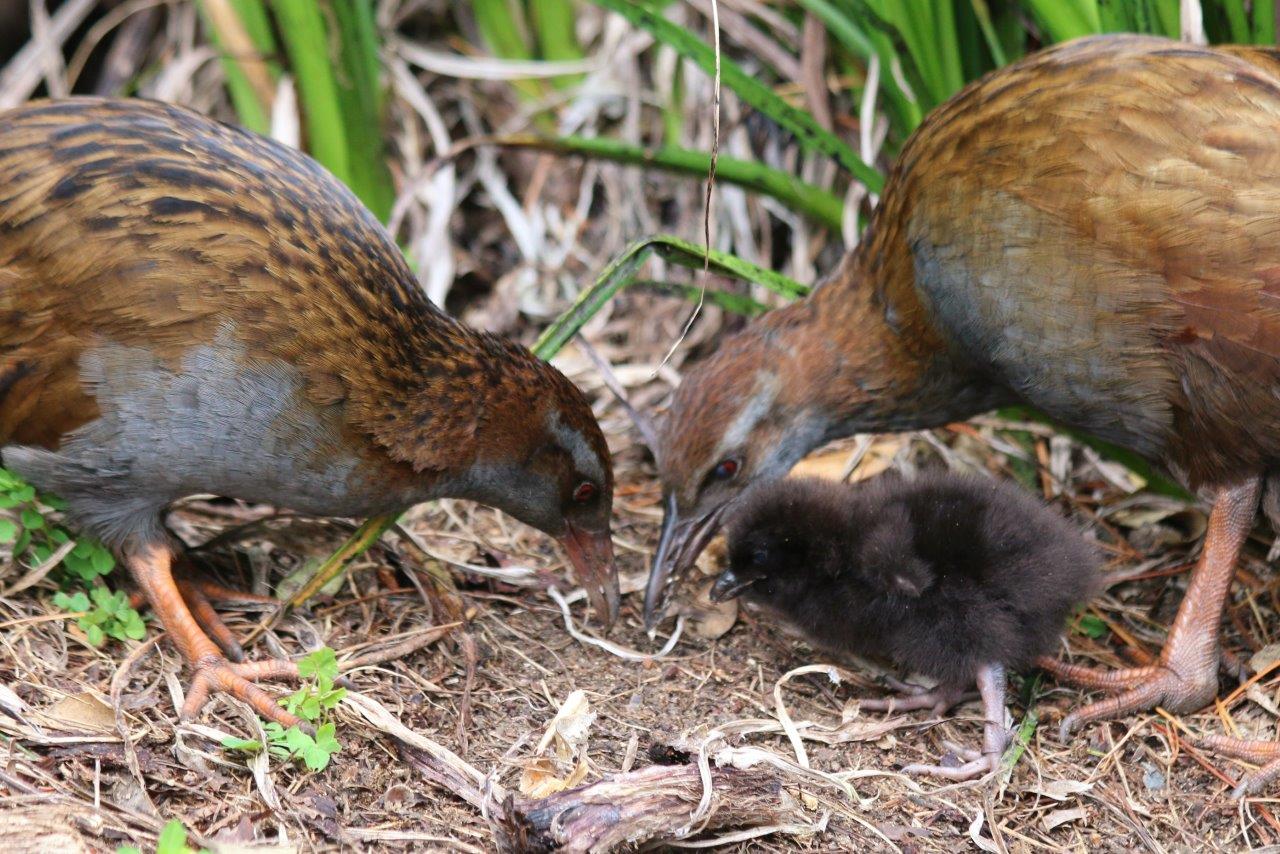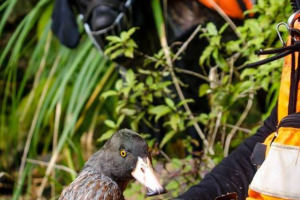10 Incredible Facts About Weka to Impress your Mates With
Weka are one of New Zealand’s many flightless birds. But compared with some of their more media-savvy contemporaries, it’s hard for them to get noticed. From the takahē coming out of hiding to the kiwi being the national icon, or the kākāpō being featured on BBC having intimate relations with someone’s head — it’s tough for a flightless bird to get noticed. Until now, as Fiona Powell shares ten incredible facts about weka to impress your mates with (and knock those other flightless birds off the perch).

Photo by Fiona Powell
Weka are hen-sized birds with caramel and black striped feathers, strong tapered beaks, sturdy dinosaur-like legs and beady red eyes, indicative of their criminal character.
A weka beak is surprisingly powerful. They mainly use them to forage for grubs and worms in the ground and can wield it like a hammer, rearing their head back for maximum impact; to break open an egg, split the husk of a phoenix palm seed, or smash the toe-nail of an unwary barefooted beachgoer.
Sadly, weka are very susceptible to predators, motor vehicle strike, habitat loss and climate change. Throughout New Zealand all species experience population booms and massive crashes. Since 1900 weka have disappeared from most regions of the North and South Islands and some subspecies are threatened.
Weka are a delightful and interesting bird in many respects; their history, intelligence, general all-round bad-boy/girl naughtiness, being a conservation conundrum, and their curious and cheeky character.
Here are some interesting weka facts to prove they are a worthy Bird of the Year winner.
Weka are often mistaken for kiwi by tourists
A chance encounter with a weka is a highlight for our tourists, even if they think they’ve seen a kiwi. Instagram bulges with artistically filtered photos of mischievous weka dragging sleeping bags out of tents with their beak or running into the bush carrying a teaspoon. The captions proudly proclaim: “We saw a kiwi!”
In fact, identity theft is actively encouraged by locals keen to boast about our country’s attractions to visitors. With the kiwi in hiding all day locals have to resort to pointing at a weka and yelling, “It’s a southern short-beaked kiwi!”
Weka are cunning thieves
Check out the weka social media feeds. People inevitably and predictably comment about the weka thieving something. “A weka stole my – shoes”, “ underwear”, “watch”, “sausages”, “phone”, “keys”, “chips”, ‘roast lamb”… The list goes on…
Weka poop their body weight in a day
That’s a LOT of poop. And be warned it’s very smelly and stains carpet forever. Never corner a weka inside.
Weka like to garden
Just planted some lettuces? Your local weka will kindly pull out your lettuce plant to check its root health and to pick off any aphids, slugs, white fly etc. You’re welcome!
Weka get voted off most island sanctuaries (even the ones where they naturally occur)
Weka are a conservation conundrum (and a conservationist’s worst nightmare). Weka’s predatory behaviour makes them unwelcome on pest-free sanctuaries where they are a threat to burrowing seabirds, ground-nesting birds and reptiles. Yet, weka are a threatened endemic species themselves and also need protection from predators.
Weka are important pest controllers and seed dispersers
Weka are known to kill rats and mice, making them an ecological good guy. They also provide crucial ecosystem services by being the primary disperser of seeds, like the hinau fruit.
Weka don’t need google maps to find their way home
Weka possess an extraordinary homing instinct and in one notable case in the late 70’s three weka
were banded before being removed from Maud Island, in the Marlborough Sounds. They were
released several kilometres away on the mainland. However, the trio were back on the island within
days, after a long hike and a 900-metre swim against the current.
Weka are a contender as our national bird
Weka have been winning hearts and minds for many years. Charlie Douglas (“Mr. Explorer Douglas”), a well-known explorer of the West Coast in the late 1800’s, was an avid admirer of the weka or ‘Maori hen’. He questioned why New Zealand hadn’t selected the weka as its national bird. In his field journals he listed the qualities of a weka; its personal valour, an undying thirst for knowledge, an affection for, and brave defender of, its young and an intelligence, beyond instinct, far higher than he’d seen in a bird before.
People born on Chatham Island call themselves “weka”, as opposed to “kiwi”, because weka are such an integral part of the Chatham Island identity.

Weka have been hyped as a potential export meat
Weka are fully protected but renegade farmer Roger Beattie controversially claims weka should be commercially farmed for their meat. He believes farming weka would save them from extinction. (Roger also coined the famous “weka weka woo” call.)
Weka have inspired poetry
Eileen Duggan, a famous New Zealand poet, in the mid-1900’s composed a poem about Weka. The poem alluded to the weka’s cheeky character:
You’re gay as a gossip and vain as a man–child,
You snatch at a bright thing and bear it away.
As well as noting the weka’s population decline:
But it’s my pity your footprints grow rarer;
Little brown mischief, don’t slip from our sight.
Weka is worthy of Bird of the Year
Sure, the weka can be bit of a bad boy but they’re true characters and as one of our vulnerable flightless species deserves recognition as Bird of the Year! Vote for weka at www.birdoftheyear.org.nz!

